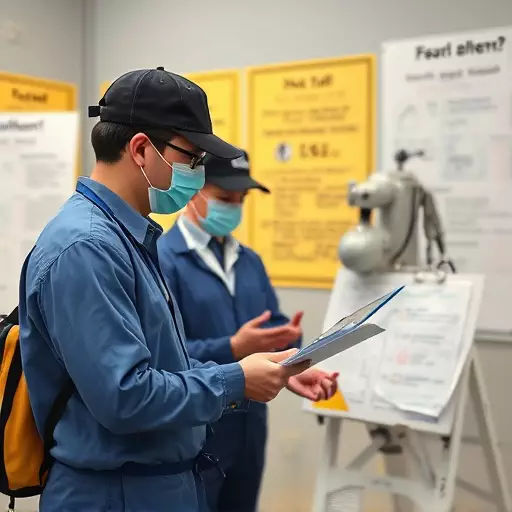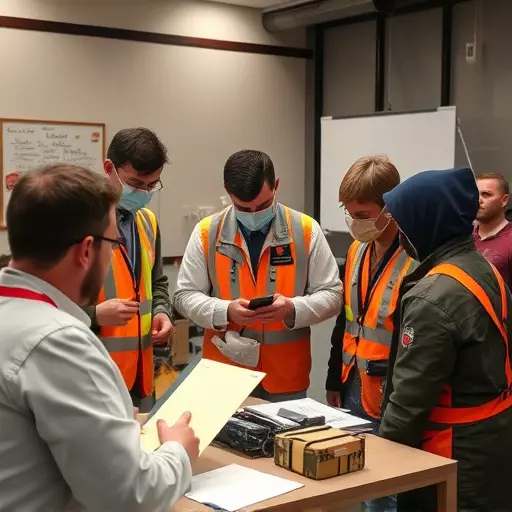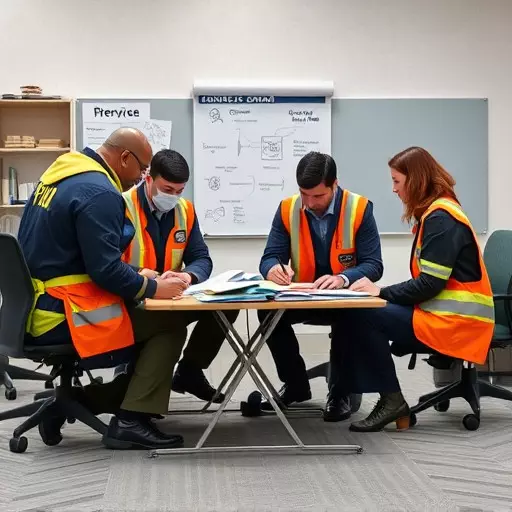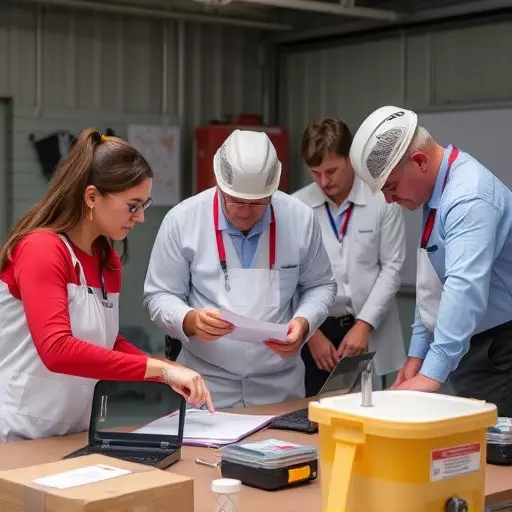Process Hazard Analysis (PHA) is a comprehensive risk management strategy in pharmaceuticals, utilizing specialized knowledge and tools from pha facilitation experts to identify and mitigate risks across manufacturing processes. These experts employ advanced hazard identification techniques to scrutinize every step of production, ensuring thorough risk assessments. This proactive approach enhances safety protocols, complies with regulatory standards, and protects workers and consumers, ultimately enabling informed decision-making and the safe delivery of high-quality medications. Through structured methods like FMEA and scenario-based exercises, PHA facilitation experts uncover potential hazards, driving continuous improvement in product quality and worker safety.
“In the stringent world of pharmaceuticals, Process Hazard Analysis (PHA) stands as a robust framework for identifying and mitigating risks within manufacturing processes. This article delves into the critical role of PHA facilitation experts, exploring how their expertise enhances safety and efficiency. We uncover essential tools and methodologies for effective PHA facilitation, highlighting advanced hazard identification techniques. Furthermore, we examine real-world case studies showcasing successful PHA applications in pharmaceutical production. Finally, we glimpse into future trends, emphasizing continuous improvement in PHA methodology.”
- Understanding PHA (Process Hazard Analysis) in Pharmaceuticals
- The Role of PHA Facilitation Experts in the Industry
- Key Tools for Effective PHA Facilitation
- Unlocking Hazard Identification Techniques: A Comprehensive Approach
- Implementing PHA in Pharmaceutical Manufacturing Processes
- Case Studies: Successful PHA Applications in Pharma
- Future Trends and Continuous Improvement in PHA Methodology
Understanding PHA (Process Hazard Analysis) in Pharmaceuticals

Process Hazard Analysis (PHA) is a critical tool in the pharmaceutical industry for identifying and mitigating potential risks within manufacturing processes. Facilitated by expert teams, PHA goes beyond traditional risk assessment methods by employing advanced techniques to uncover hidden hazards. These experts use specialized pha facilitation tools to navigate complex processes, ensuring every stage—from raw material handling to product packaging—is thoroughly evaluated.
By employing these comprehensive hazard identification techniques, pharmaceutical companies can proactively address risks associated with chemical reactions, equipment failures, and more. PHA facilitates informed decision-making, enabling the implementation of effective control measures and safety protocols. This proactive approach not only safeguards workers and consumers but also ensures compliance with stringent regulatory standards.
The Role of PHA Facilitation Experts in the Industry

In the pharmaceutical industry, PHA (Risk-based Hazard Analysis) is an indispensable process for identifying and mitigating potential risks associated with drug development and manufacturing. Here, pha facilitation experts play a pivotal role in guiding teams through this complex analysis. These experts are well-versed in advanced hazard identification techniques and have a deep understanding of regulatory requirements, making them invaluable assets. They employ specialized pha facilitation tools to streamline the process, ensuring that every aspect of potential risks is thoroughly explored and documented.
By leveraging their expertise, pha facilitation experts enhance overall efficiency and accuracy. They facilitate collaborative discussions, enabling cross-functional teams to contribute diverse perspectives. This inclusive approach yields comprehensive risk assessments, as various hazard identification techniques are employed to uncover subtle yet critical risks. Ultimately, their role ensures that pharmaceutical companies can navigate regulatory hurdles with confidence, bringing safer medications to market while adhering to stringent industry standards.
Key Tools for Effective PHA Facilitation

In the realm of pharmaceutical manufacturing, Process Hazard Analysis (PHA) is an indispensable tool for identifying and mitigating potential hazards within production processes. Facilitated by pha facilitation experts, this rigorous evaluation process leverages a combination of specialized pha facilitation tools to unearth risks that might be overlooked during routine quality control. These tools include robust hazard identification techniques like the What-If technique, FMEA (Failure Mode and Effects Analysis), and HAZOP (Hazard and Operability Study), which collaboratively dissect complex processes, identifying both inherent and controlled hazards.
Effective pha facilitation goes beyond mere checklist ticking; it involves engaging cross-functional teams to foster a culture of proactive safety. By encouraging open dialogue and leveraging advanced pha facilitation tools, experts ensure that every process variable is scrutinized, every potential failure mode is documented, and appropriate risk mitigation strategies are developed. This holistic approach not only enhances the accuracy of hazard identification but also fosters continuous improvement in manufacturing practices, ultimately safeguarding both product quality and worker safety.
Unlocking Hazard Identification Techniques: A Comprehensive Approach

In the pharmaceutical industry, effective hazard identification is paramount to ensuring product safety and quality. This involves a meticulous process where PHA facilitation experts employ advanced tools and methodologies to unearth potential risks associated with drug development and manufacturing. By leveraging these techniques, they can navigate complex systems, from raw material procurement to final product distribution, identifying hazards that may go unseen.
Comprehensive hazard identification requires a structured approach, utilizing both qualitative and quantitative methods. PHA facilitation experts use tools like failure modes and effects analysis (FMEA), risk assessment matrices, and scenario-based exercises to explore every facet of a pharmaceutical process. This holistic perspective ensures no stone is left unturned in the quest to minimize risks, ultimately enhancing product safety and fostering public trust.
Implementing PHA in Pharmaceutical Manufacturing Processes

Implementing PHA (Process Hazard Analysis) in pharmaceutical manufacturing processes is a strategic step towards enhancing safety and ensuring product quality. Pha facilitation experts leverage specialized tools to systematically identify potential hazards associated with each stage of production, from raw material handling to final packaging. By employing robust hazard identification techniques, they uncover weaknesses in the current process that could lead to catastrophic failures or contamination.
This proactive approach allows manufacturers to implement effective risk mitigation strategies. pha facilitation tools, such as fault tree analysis and event tree analysis, provide a structured framework for understanding the causes and consequences of potential incidents. This enables pharmaceutical companies to prioritize hazards based on their likelihood and impact, focusing resources on areas that need the most attention. The result is a more secure manufacturing environment where product consistency and patient safety are paramount.
Case Studies: Successful PHA Applications in Pharma

In recent years, pharmaceutical companies have increasingly turned to Process Hazard Analysis (PHA) as a powerful tool for identifying and mitigating risks associated with their manufacturing processes. Case studies demonstrate that PHA facilitation experts play a pivotal role in driving successful risk management strategies within the industry. These experts utilize specialized pha facilitation tools to guide teams through rigorous hazard identification techniques, ensuring comprehensive coverage of potential risks.
By applying these methodologies, pharmaceutical companies have achieved notable successes, such as optimizing production processes, enhancing safety protocols, and improving overall product quality. Through real-world applications, it’s evident that PHA facilitates informed decision-making, fosters a culture of risk awareness, and ultimately contributes to the development of safer and more efficient pharmaceutical products.
Future Trends and Continuous Improvement in PHA Methodology

The future of PHA (Process Hazard Analysis) in the pharmaceutical industry looks set to be shaped by continuous improvement and innovative methodologies. As regulatory standards evolve, so too will the demand for more sophisticated hazard identification techniques and effective risk mitigation strategies. PHA facilitation experts are increasingly leveraging advanced tools and technologies to streamline the process, making it faster and more comprehensive. These include robust software platforms that aid in data collection, scenario modeling, and risk assessment, enabling pha facilitation teams to identify potential hazards with greater accuracy and efficiency.
Looking ahead, the industry is poised to adopt more proactive approaches to risk management. This involves integrating PHA into the product development lifecycle from the outset, ensuring that safety considerations are embedded at every stage. By fostering a culture of continuous improvement, pharmaceutical companies can enhance their ability to respond swiftly to emerging challenges and maintain high standards of patient safety. Advanced hazard identification techniques, combined with enhanced pha facilitation tools, will empower industry professionals to navigate complex processes more effectively, ultimately driving the development of safer pharmaceuticals.


